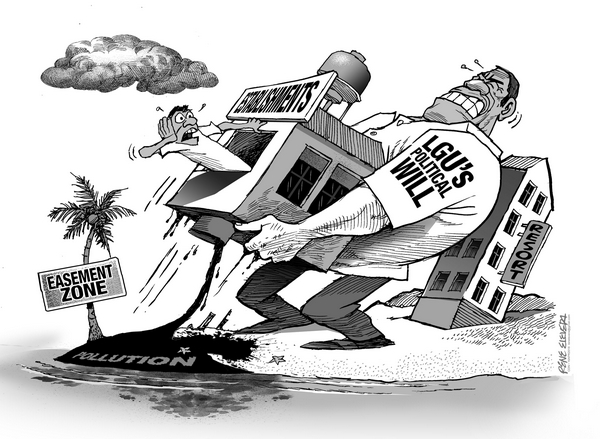
The momentum that is growing towards making Cebu seashores and lands by the water clean and healthful needs to be sustained.
In Lapu-Lapu City, Mayor Paz Radaza has planned the demolition of coastal shanties that to her mind are sources of coliform infestation of the sea.
In Cebu City, environment leader Nida Cabrera plans to involve coastal communities in raising the quality of their waters that she suspects are heavily contaminated by coliform bacteria.
An environment suffused with coliform is not in itself harmful. Coliform bacteria are so ubiquitous they can even be found on human skin.
In fact, some strains of E. coli bacteria help keep the digestive tract healthy. Perhaps this is the reason the environment department does not warn people against swimming in the sea off Mactan Island.
Nevertheless, just as the absence of coliform signifies the absence of other disease-causing microbes, so is their presence conducive to the thriving of microorganisms that when ingested with water cause illnesses like diarrhea and hepatitis.
In serious cases, ingestion of water with strains of E. coli lead to pneumonia, breathing problems, and urinary tract infections.
Without a doubt, there is wisdom in clearing Mactan’s waterfront slums. They understandably have low quality septage facilities, and this means they are very well the sources of contaminating fluids that seep into the sea.
Demolitions, however, cannot be lawfully done minus guarantee of relocation for the people affected.
By ensuring their resettlement, the Lapu-Lapu City will have balanced our need for a livable ecology with settlers’ basic shelter rights.
What Lapu-Lapu City can achieve, Cebu City should be able to do, too.
Then local governments will have indicated themselves open as they should be to being held to a high standard of fair application of the law.
If ordinary residents may be moved from their dwellings for the sake of Mother Earth, nothing should stop local governments from exercising political will to make commercial establishments observe laws on easement.
That these companies have waste treatment facilities does not let them off the hook.
The law is the law, and when a resort sets up sea walls or other structures that encroach beaches within three meters of high tide point or a mall stands on top of creeks or rivers, their proprietors violate the law.
We call on local governments to hold them accountable for their outlawry and reverse it.
Disclaimer: The comments uploaded on this site do not necessarily represent or reflect the views of management and owner of Cebudailynews. We reserve the right to exclude comments that we deem to be inconsistent with our editorial standards.
